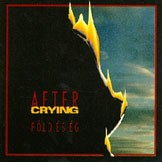 |
Vol 2, No 12
27 March 2000 |
|
|
 H U N G A R I A N M U S I C:
H U N G A R I A N M U S I C:
Not for Dummies Mel Huang One of the most innovative bands on the Hungarian music scene is the experimental After Crying. Comprised of extremely talented musicians, After Crying stands in the forefront of "intelligent" music in Hungary and beyond -having found a significant following as far as Venezuela. Merging elements of various genres of music, such as rock and classical, the final product is nothing short of challenging for the listener. The musicianship of After Crying's eight members is definitely one of the band's strengths. The members are all specially trained, many at the Music Academy or Conservatory. The core of the band, which defines the band's direction, is composed of Gábor Egervári (flute, lyrics, concert engineer), Tamás Görgényi (lyrics, art director, concepts, vocals), Péter Pejtsik (cello, bass, vocals, composer), Ferenc Torma (guitar, keyboards, vocals, composer), and Balász Winkler (trumpet, keyboards, vocals, composer). This core is augmented by Zoltán Lengyel (keyboards), Zsolt Madai (drums, percussion, keyboards) and Gábor Légrádi (vocals). One of the interesting aspects of After Crying's live performances is way in which the musicians change instruments or at times play two instruments simultaneously to keep the music flowing at its most complex moments.
Görgényi goes on to describe the band's musical philosophy: "As we used to say, music is one inseparable whole. Rock is the horizontal line, while the classical approach and tradition is the vertical line for us... So we never see any contradiction between rock and the classical approach, traditions and modern means." This is partly apparent from the list of some of the band's main influences: "Bach, Mozart, Beethoven, Wagner, Bartók, Keith Emerson and ELP, Robert Fripp and King Crimson." However, Görgényi stresses, "We listen to a lot of different kinds of music, because we want to know what is going on in the world." This wide focus has paid off for the band in some ways. Though it has been around in various forms for over ten years, it has only gained serious interest beyond Hungary's borders in the past few years, particularly in the growing progressive rock market. Within a short time, the band bas become one of the most talked-about bands on the circuit. The industry's leading magazine, Progression, referred to After Crying as "Hungary's hot progressive export." 
Each recording the band produced (see discography at the end of this article) seemed to feature yet another set of creative compositions played to perfection, ranging from the haunting passages on De Profundis to the two-part Keith Emerson-tribute "Manticore érkezése" on Föld és ég. The band went through many member changes through the years, but the departure of former primary composer Csaba Vedres in 1994 served as a definite turning point. Since then, the band has remained solidly intact with its current eight-member line-up, with the core five composing the music. Péter Pejtsik told Progression magazine, "The strange thing about After Crying is, indeed, the fact that we are all extremely good musicians. Because of the ease with which our members read their scores, I'm allowed the opportunity to write various arrangements for our compositions." The band also takes a more-than-serious approach to live performances - rather akin to classical than rock.
Finally, Central Europe Review asked Görgényi about the music scene in Hungary today: "It is quite a flat scene. A million cheap bands and performers chasing big money, trying to copy the biggest and smaller Western stars, who do the exact same stupid music." All members of After Crying are quick to praise Gergely Böszörményi, publisher of the band's music, for having the vision to promote and support this part of Hungarian music. After Crying is an experience to be enjoyed both on record and in concert. It is a musical phenomenon, requiring the undivided attention of its listeners. Fans who discover After Crying come back for the challenge repeatedly, and the band's eight brilliant musicians are more than happy to reciprocate and meet that challenge each time. 2000 Struggle for Life - the band's new live double CD, just released. 1998 Almost Pure Instrumental (BGCD 027) 1997 "6" (BGCD 009) 1996 Első étvized (BGCD 006-007) 1996 De Profundis (BGCD 005) 1994 Föld és ég (BGCD 002) 1992 Megalázottak és megszommorítottak (QUI 906014) 1990 Overground Music (BGCD 001) Upcoming Concerts 18 March Orion Studios, Baltimore, MD, USA 19 March Hungarian Consulate, New York City, USA 22 April Spirit of '66 festival, Verviers, Belgium 24 April Royan, Paris, France 12 May Petőfi csarnok, Budapest, Hungary Links to more information Official After Crying page (in English)
|
|
![]()
Copyright © 2000 - Central Europe Review and Internet servis, a.s.
All Rights Reserved
 Upon listening to any of the band's works, it is clear that its members want to challenge their listeners' intellect. As Tamás Görgényi tells Central Europe Review, "I think we proved that most people around the world love meaningful and intelligent music if they get the chance to listen to it. But commercialism all over the world does its best to prevent it." Though thoroughly enjoying the success it found in progressive rock and among the genre's fans, Görgényi stresses that the band "always wanted to make contemporary music" beyond any attached – and at times restrictive – label.
Upon listening to any of the band's works, it is clear that its members want to challenge their listeners' intellect. As Tamás Görgényi tells Central Europe Review, "I think we proved that most people around the world love meaningful and intelligent music if they get the chance to listen to it. But commercialism all over the world does its best to prevent it." Though thoroughly enjoying the success it found in progressive rock and among the genre's fans, Görgényi stresses that the band "always wanted to make contemporary music" beyond any attached – and at times restrictive – label.